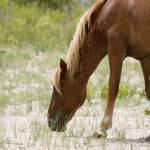Psyllium and Probiotics Combination for Prevention of Sand Colic

Consumption of sand by horses causes chronic diarrhea, weight loss, and colic. Sand enters the digestive tract when horses graze sandy pastures or eat feed and hay off the ground in sandy environments. Although not all horses affected by intestinal sand shed sand in the feces, fecal sand sedimentation is a recognized screening tool for horses suspected to have some degree of intestinal sand.
A recommendation for preventing or minimizing sand consumption is to place hay off the ground in hay nets, feed bunks, feed racks, or on rubber mats. Keeping an adequate supply of hay can reduce consumption of sand caused by scavenging overgrazed pastures. Psyllium is commonly recommended as a bulk laxative to prevent sand accumulation, although its effectiveness in horses has not been completely confirmed by research. Psyllium, a vegetable fiber derived from the ripe seeds of the Plantago plant, is believed to stimulate peristaltic contractions in the intestine, pushing ingesta through the tract. Probiotics and prebiotics are known to have beneficial effects on the equine gastrointestinal tract, but have not previously been studied in respect to sand removal.
This study was designed to test the hypothesis that feeding a nutritional supplement combining probiotics, prebiotics, and psyllium would increase fecal sand output in clinically normal horses in a natural environment.
How was the study conducted? Eight clinically normal horses/ponies of mixed breeds and ages varying from 6 months to 26 years were housed on pasture in Colorado. Soils were determined to be about 30% sand. The horses were supplemented with hay as needed to maintain body weight and were fed in large plastic feed tubs secured to the fence posts. During the first 7 days of the experiment, manure was collected daily and tested for sand in all animals; this was the control period to establish normal sand output of each animal. During the next 35 days, the horses were supplemented with a product that combined psyllium, Lactobacillus acidophilus, Enterococcus faeceum, and Saccharomyces cerevisiaetwice a day mixed into a small amount of commercial concentrate. Feces were collected daily for the first 14 days and the last 7 days of the experimental period.
Sand content of the feces was isolated by using a flotation decanting method that consisted of first mixing a standardized amount of the feces with water in a plastic rectal sleeve and hanging it for 8 hours to let the sand accumulate in the finger tips. Then the manure was removed and resuspended in water for further serial decanting to separate fecal matter from sand. The accumulated sand was dried and then weighed. To adjust for differences in fecal output per individual, fecal sand was standardized as milligrams of sand per gram of feces. Output from the first 7 days was compared with output from the following days of treatment.
What does this research tell us about managing horses to minimize the problems associated with sand ingestion? In this study, the fecal sand output in the 7 days prior to the start of supplementation was unchanged. During the first 3 days of supplementation, fecal sand output was no different than during the control period. However, after day three and through the rest of the treatment period, fecal sand output remained significantly higher than pretreatment. The average fecal sand output was at least 2.5 times greater during treatment than in the pretreatment period. It should be noted that the overall dose in this study was half the normally recommended amount of psyllium and was still effective. The result of the study demonstrated that supplementing with the mixture of psyllium, probiotics, and prebiotic enhanced fecal sand clearance in normal horses.
Although the mechanism of sand clearance from the gastrointestinal tract is not well understood, the researchers felt that the effectiveness of the product was due to psyllium increasing gut motility (rather than trapping the sand). Also, the probiotic and prebiotic supplementation may have reduced inflammation normally caused by sand accumulation, thus improving the health and overall motility of the large intestine.
Landes, A.D., D.M. Hassel, J.D. Funk, and A. Hill. 2008. Fecal sand clearance is enhanced with a product combining probiotics, prebiotics, and psyllium in clinically normal horses. J. Equine Vet. Sci. 28:79-84.








